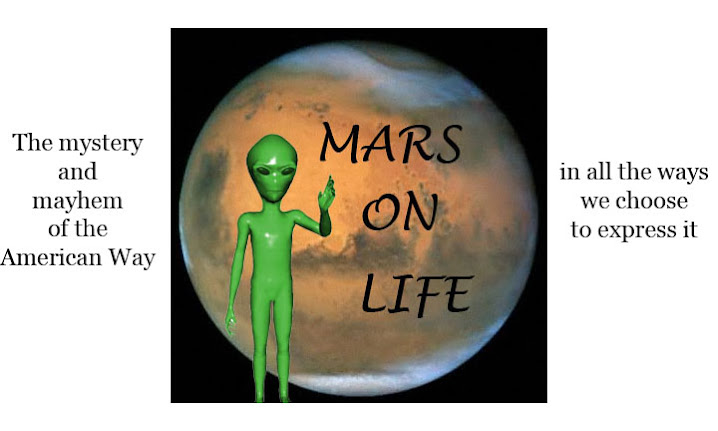
We like to watch. We have become a culture of voyeurs, of eavesdroppers, and of spies, and we wouldn't have it any other way. We are Romans in front of our digital Colosseum, with our tub of Cherry Garcia and a frosty mug of schadenfreude to wash it all down.
This is the core premise of reality television. We enjoy watching others sing, dance, swap wives, lose weight, find love, fail miserably, and face public humiliation. We have finally acknowledged that narrow existences and blood lust go together like coleslaw and peanut butter. In other words, we like a gassy but tasty treat.
In the infant days of television, Queen for a Day and Strike It Rich exploited the unfortunate with exacting care. The bigger the misfortune, the greater was the chance to win money, to win that night on the town, to wear that paper crown. A major life event for the contestants was for viewers just one more telegraph pole of better thee than me, flashing by as quickly as creative minds could storyboard new series.
People like to do stupid things for money. That's human nature; money doesn't drop from the skies above with reliable frequency. They also like to do stupid things for hope, which is perhaps more insidious. Hope is a strange thing, tied as it is into the transience of happiness. But happiness requires an ability to look at the smallest things and we are nothing if not big-picture viewers.
Although competitive reality shows have a linear narrative and by progressive elimination result in a winner, they also drop us in media res. It's this interruption that makes reality shows so terribly unnerving; it's as if we have caught the contestants with their collective pants down. Disregard that the poor schmucks signed up and auditioned for Beauty and the Geek or The Biggest Loser and that whatever happens is their own doing. By permitting us to interrupt them mid-stream (or at their nadir), they ask us to accept their flaws without wondering about their imaginations. That we should want to be publicly successful is a given. We should also neither deny nor deprive anyone of the right to purchase a ticket to a fool's paradise.
Reality shows work precisely because the contestants are not us. Nor are they our neighbors or co-workers. If they were, we might feel a tinge of guilt or self-loathing. We might recognize ourselves in their blueberry crumb cake, in their demotic street idiom, or in their stumbling attempts to attract the opposite sex.
We might recognize what happens when we stop trying to be more than what we are. That's the main point of interest anyway, even if we will never admit it to ourselves. The waitress who never finds the millionaire and keeps slinging pancakes, the overeater who cannot live without the comfort of Little Debbie, the washed-up celebrity who never realizes that there are very few second chances when the first wasn't all that much to begin with--all are case studies in ordinariness.
What the shows prove is that our skill at self-assessment is at an all-time low. We fade into and out of some alternate reality where the inner self--always beautiful, talented, and skilled--is finally revealed as truth. Whatever our personal history may be, we will use it and in turn let it be used and then hope that time will eradicate it.
America's Next Top Model occupies a unique position in reality programming. Its big prize, a modeling contract with Elite, is specious at best. None of the ANTM winners has approached standard markers for industry success. America hasn't produced many top models since the late 1980s; what it produces are girls with bigger impossible dreams than they had when they auditioned. As with American Idol, the real prize is hope for what happens after, for the future. Whether the winner will be a success beyond the show depends upon the winners' suitability for an industry that wouldn't look at her twice without the donated prize. Tyra Banks's contestants are home girls, chicas, out of shape, illiterate, immature, damaged and only occasionally viable.
But Banks thrives on preaching positivism to the underclass; one need only hear her pep talks to the discarded to understand that ANTM is simply another version of Queen for a Day, with the latter's paper crown replaced by a paper contract.
What is it about competitive reality shows that turns the thought processes of adults into the delusions of children? All children think they are the fastest until they cross the finish line in last place. It takes repeated failure to realize that we aren't all winners, all of the time. Yet the reality contestants cannot seem to honestly analyze themselves viz other competitors or even to make much of a guess at their own qualifications other than the presumption of wanting something more than someone else wants it.
That the ANTM contestants will never be top models goes without saying. The modifier is as incorrect as the sham is transparent. And yet dreams aren't modifiable, not when they trade so heavily on all or nothing. A few of the contestants are rational enough not to buy into the fantasy in the first place and toss the inevitable rejection off with a shrug, but those for whom the show is painted in terms of black and white respond to the judging with Pavlov's psychic secretions.
Many of ANTM's contestants have a hard time surviving in the present, let alone the future. They've either already tried and failed or haven't had the gumption to do so unaided; their narrative has only so far to go. They've bought countless magazines and practiced for hours in the mirror; why isn't this a surefire predictor of success? Who knows how best to pose while wearing a slab of raw beef? What exactly is the expression of a country singer and how do you arrange your legs to reflect that musical orientation?
In each episode but the final, photo shoots are the main qualifier. Here, where communication should be crystal clear, it isn't, and neither is the models' skill at translating the nebulous commands. They are only praised when something is good and mocked when something isn't, but why something is one way and not another is never quite relatable. There is simply too much going on in their amateur efforts to make a specific critique effective. "You're like....when you should be like..." is as close as many come to receiving constructive criticism.
ANTM photo shoots are not ballet classes and the best photos are achieved not by skill but by sheer luck. Frequently Banks's own photos appear just as awkward, making one wonder about the nature of elusion.
Banks's unbothered confidence in the face of lesser mortals is the show's defining comedy. While the contestants stand for judgment, Banks squints without squinting, overuses the adjective "fierce," grimaces, rigs the photo selection, and dispenses advice to which the contestants nod in dim agreement.
Tyra Banks will not be quitting America's Next Top Model despite an alleged feud with Jay Manuel, overlord of ANTM's photo shoots. Or she will not be quitting ANTM despite becoming a political pundit on her own talk show. Tyra Banks will continue, says an insider, to do both. Tyra Banks will continue to produce television that enlivens our mid-week ennui and makes our cup brim over from the suppression of our own worst impulses. It's sort of the same reason we watch QVC, except that we have nothing to regret in the morning.
Saturday, March 29, 2008
Girl on Top
Labels:
America's Next Top Model,
Tyra Banks
Subscribe to:
Post Comments (Atom)









7 comments:
That Jay Manuel needs to tone down his lipstick. That's all I've learned from this crazy show!
This is ever so true.
The United States manufactured reality television and just like anything else american it rapidly spread around the world, driving masses crazy. There is a version of ANTM here in Spain, and several more copies or other shows alike.
I was quite glad to read your analysis, not because I thought you would not think the way you do, but because it is always pleasant to find an expert opinion that matches yours. The only reason why these type of programs are popular is because people get to see their very own miseries on prime time tv. There is nothing for relieving one's pain as watching someone else's having a harder time about it. So sad, but so true.
I confess myself a big fan of Project Runway and The Hills, but the few times I tried to watch any other thing of the sort, I've found myself despising the show.
Once more, bravo!
xx
Tyra is the person I love to hate most. Everything she does is perfectly spectator sport-esque; it's the trainwreck I can't look away from.
My favorite reality shows are the ones where people with REAL talent are working REALLY hard to do their best. Like Project Runway and So You Think You Can Dance.
It's a train crash that I can't help but watch.... it's a fashion joke that is fascinating at the same time because it continually baffles me how so many girls, intelligent and otherwise do go through believing to some extent that they will achieve their 'model' dreams via this Tyra Banks publicity/domination vehicle.... it's all in all some perfect for a bit of Cherry Garcia (actually, I prefer Chunky Monkey...) munching, chow-down TV time...
i could agree more with u when u say we live in a culture of voyeur
I watch occasionally out of a sense of morbid fascination with the girls, mostly uneducated strivers who wouldn't get a second look in the local mall model contest. The overwhelming message from Tyra seems to be that wanting it enough is all it takes, which in the world of professional modeling is clearly not the case.
I truly believe that at some later date we will be judged for not having stopped these shows. Judged by whom I cannot say, but judged and judged harshly. Schadenfreude is killing my soul.
Post a Comment